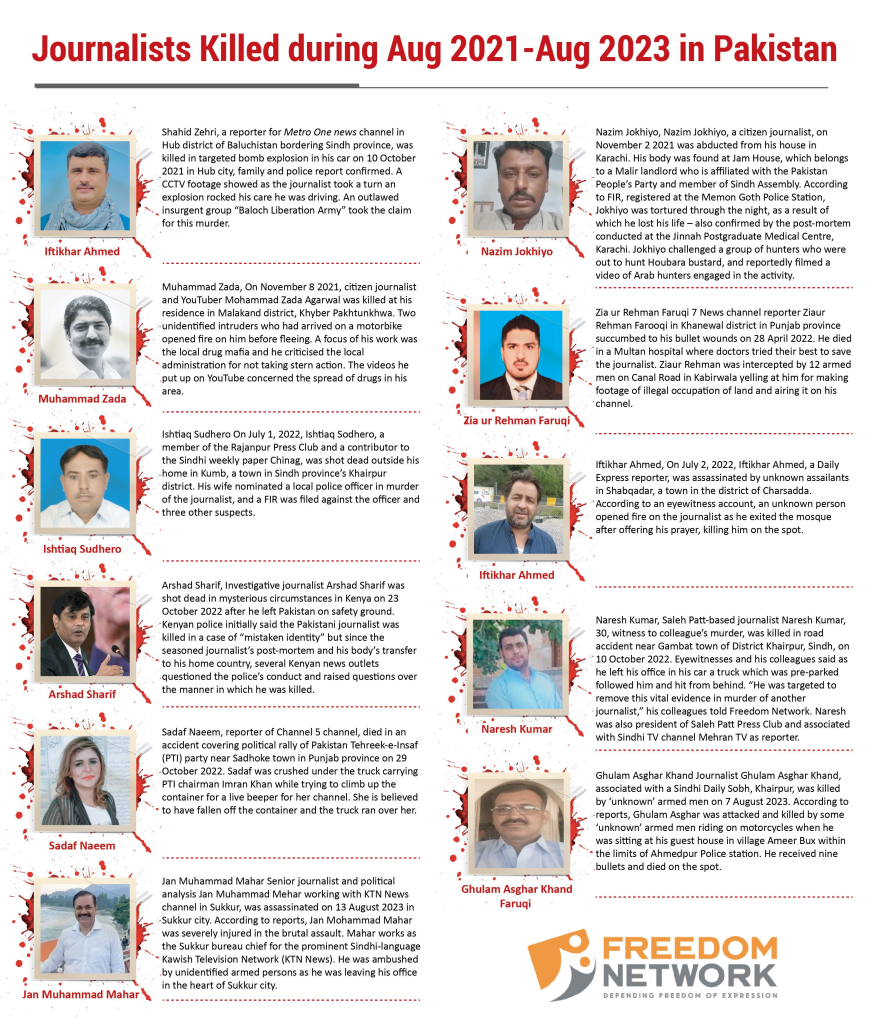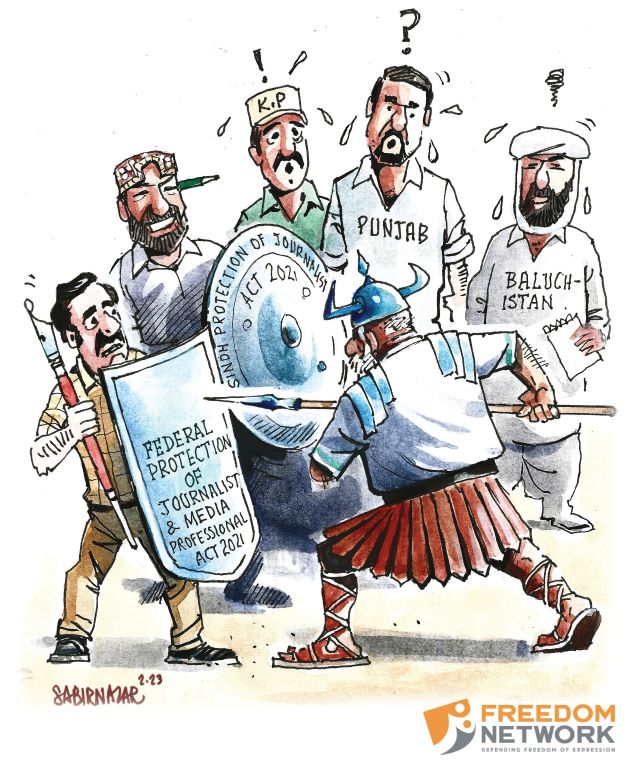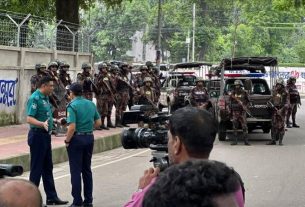The annual report by the Freedom Network on the state of impunity against media practitioners in Pakistan reveals that despite groundbreaking legislation two years ago, Pakistan continues to grapple with a rise in crimes against journalists, it emerged on Sunday.
Back in 2021, Pakistan set a global precedent by enacting specialized laws aimed at safeguarding journalists. The Sindh government introduced the Sindh Protection of Journalists and other Media Practitioners Act 2021, swiftly followed by the National Assembly passing the Protection of Journalists and Media Professionals Act 2021.
However, according to a press release, the report reveals the inefficacy of these laws in combating the escalating impunity against media professionals.
The statistics presented in the report are alarming and indicate a surge in the persecution of journalists, particularly by government authorities and state agencies. These violations include instances of kidnapping, physical assaults, and legal cases, often on unproven charges such as sedition, treason, and electronic crimes.
The report also sheds light on the attacks against journalists that largely occurred in regions where legislation aimed at their protection was enacted.
The report noted that eleven journalists lost their lives in the line of duty between August 2021 and August 2023. This distressing trend punctuates the ongoing vulnerability of journalists in the country, despite the introduction of protective legislation.

The global perspective on Pakistan’s media freedom also undergoes scrutiny in the report. While the country witnessed an improvement in its ranking in the World Press Freedom Index, climbing from 157 in 2021 to 150 in 2023, this progress is overshadowed by the failure to effectively implement the laws designed to protect journalists.
Iqbal Khattak, the Executive Director of Freedom Network, expressed deep concern about the underutilization of the legislative frameworks, stressing that both federal and provincial governments are culpable for the inadequate enforcement of the laws, resulting in delayed justice for journalists.
“It is very disturbing to see the good work of the two legislatures – the Sindh Assembly and the federal parliament – diluted by not making the laws fully operational to provide protection to journalists,” he said, while releasing the report.
Legislation and Government flaws
The report pinpoints specific lacunae in both the federal and Sindh laws. It highlights the failure to establish the mandated safety commission at the federal level, rendering the law non-operational and ineffectual. Similarly, in Sindh, although a commission was eventually established, it operated with severe constraints due to a lack of resources, impeding its ability to offer substantial protection and justice to affected journalists.
The federal Protection of Journalists and Media Professionals Act was passed unanimously by the National Assembly when Imran Khan was prime minister in 2021. After he was voted out, Shehbaz Sharif became the prime minister in 2022 until the parliamentary tenure expired in August 2023.
“In these two years, both the Khan and Sharif governments failed to establish a safety commission mandated by the law which meant that in effect the federal law remained non-operationalized and hence failed to help a single of the 93 journalists in Islamabad that were killed, attacked, injured, threatened or harassed in the two years since its enactment. The two governments also failed to enforce the law,” the report said.
A somewhat similar situation prevailed in Sindh. The Sindh Protection of Journalists and Other Media Practitioners Act was passed in June 2021 by the provincial assembly and notified officially in August 2021, but the Commission for the Protection of Journalists and other Media Practitioners (CPJMP), proposed by the law, was only notified one year late in December 2022 with respected jurist Rasheed A Razvi appointed its first chairperson.
“Even after the Commission was set up to ensure enforcement of the law, the Sindh government until August 2023 had failed to provide either an office, staff or a formal budget for its operations, thereby procedurally hampering its operations and severely restricting the Commission’s ability to provide protection, relief and justice for the growing number of violations against journalists and media entities in Sindh province,” the report notes.
How to protect journalists now?
The report concludes with three urgent recommendations to rectify the current situation and to benefit from the promise of two legislations on journalists’ safety. It calls for the immediate formation of a safety commission under the federal Protection of Journalists and Media Professionals Act, adequate resourcing for Sindh’s Commission for the Protection of Journalists and Other Media Practitioners, and the enactment of similar safety laws in provinces like Balochistan, Khyber Pakhtunkhwa, and Punjab after the 2024 provincial elections.
“Pakistan has a golden opportunity to become one of the strongest global performers in combating impunity for crimes against journalists with presence now on its statute books of the two specialist journalists’ safety legislations, thanks to the efforts of many stakeholders over several years, especially the Pakistan Journalists Safety Coalition,” the report said.
“But for this promise to materialize, these three recommendations must be implemented on priority.”__Courtesy Tribune.com





